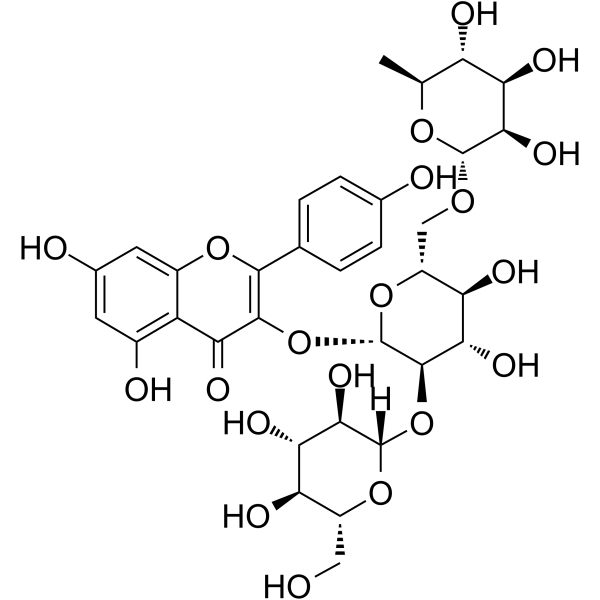
Kaempferol-3-O-(2-O-beta-D-glucopyl)-beta-D-rutinoside
CAS No. 55696-58-7
Kaempferol-3-O-(2-O-beta-D-glucopyl)-beta-D-rutinoside( —— )
Catalog No. M32358 CAS No. 55696-58-7
Kaempferol-3-O-(2''-O-β-D-glucopyl)-β-D-rutinoside is a naturally occurring glycoside present in the seeds of Camellia oleifera.
Purity : >98% (HPLC)
 COA
COA
 Datasheet
Datasheet
 HNMR
HNMR
 HPLC
HPLC
 MSDS
MSDS
 Handing Instructions
Handing Instructions
| Size | Price / USD | Stock | Quantity |
| 5MG | 438 | In Stock |


|
| 10MG | 709 | In Stock |


|
| 50MG | Get Quote | In Stock |


|
| 100MG | Get Quote | In Stock |


|
Biological Information
-
Product NameKaempferol-3-O-(2-O-beta-D-glucopyl)-beta-D-rutinoside
-
NoteResearch use only, not for human use.
-
Brief DescriptionKaempferol-3-O-(2''-O-β-D-glucopyl)-β-D-rutinoside is a naturally occurring glycoside present in the seeds of Camellia oleifera.
-
DescriptionKaempferol-3-O-(2''-O-β-D-glucopyl)-β-D-rutinoside is a naturally occurring glycoside present in the seeds of Camellia oleifera.
-
In Vitro——
-
In Vivo——
-
Synonyms——
-
PathwayOthers
-
TargetOther Targets
-
Recptor——
-
Research Area——
-
Indication——
Chemical Information
-
CAS Number55696-58-7
-
Formula Weight756.66
-
Molecular FormulaC33H40O20
-
Purity>98% (HPLC)
-
Solubility——
-
SMILES——
-
Chemical Name——
Shipping & Storage Information
-
Storage(-20℃)
-
ShippingWith Ice Pack
-
Stability≥ 2 years
Reference
molnova catalog



related products
-
4-aminobenzoic acid
4-Aminobenzoic acid is an intermediate in the synthesis of folate by bacteria, plants, and fungi.
-
MPO
MPO is a hatch and growth of Caenorhabditis Elegans inhibitor.
-
3-Methylbutanoic aci...
3-Methylbutanoic acid is a naturally occurring aroma compound found in Bartlett pear brandies vanilla beans rape-honey and banana.



 Cart
Cart
 sales@molnova.com
sales@molnova.com


